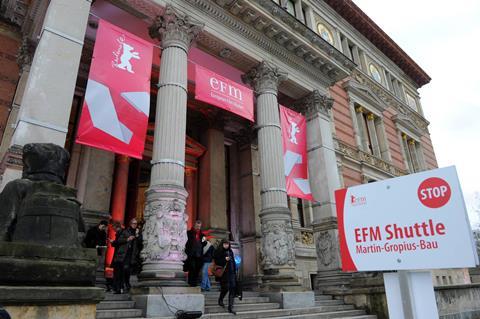
The number of participants accredited at this year’s European Film Market (EFM) in Berlin was the lowest since 2013 with a year-on-year drop of around 16%, according to figures supplied by the EFM.
The new security regulations restricted access to the two main venues over the market’s first weekend (from Friday February 8 to Monday February 11) to market badge holders undoubtedly had an impact.
Now criticism is growing from a number of paying exhibitors who say the controversial new policy has dented business
According to the EFM, a total of 8,358 participants were accredited for the EFM this year, more than 1,600 fewer than the 9,973 registered in 2018.
The number of exhibitors and buyers increased slightly this year – with the total number of companies with stands and offices up from 546 to 551 and the number of buyers up from 1,837 to 1,885. But the number of films and screenings slipped year-on-year by almost 10%; from 800 films in 2018 to 730 this February and from 2018’s 1,112 screenings to 1,025 this year.
The number of market premieres climbed from last year’s 586 to 598 in 2019.
EFM director Matthijs Wouter Knol said it was too early to draw any conclusions. “The market has just finished and as we have not evaluated the participants’ statistics and visitor flows yet, it is too early to interpret the figures of this year’s market,” he cautioned. “Overall, EFM has proven to be a healthy market with all relevant sellers and buyers attending the market. Based on the industry professionals who have attended this year and the positive feedback we got from many participants in the market, there is no reason for worries.”
Knol suggested the new access rules “had a positive effect on the overall attendance of EFM: with a rise of market badge sales, overall attendance during this edition was dominated by an increasingly professional crowd, and only the numbers of visitors with festival accreditation dropped.”
“Numerous exhibitors and buyers expressed their appreciation for this year’s concentrated business atmosphere and EFM’s extended range of services,” he said.
Mixed reaction
However, the sentiment is not shared by some EFM stand-holders, including those whose usual clients – producers and festival programmers – only held festival accreditation and fell foul of the new entry requirements. Consequently, the hotel lobbies in the Ritz Carlton, Hyatt and Marriott hotel were noticeably busier this year as were cafes and restaurants in and around Potsdamer Platz.
One of the most publicly vocal critics of the new admissions policy was French sales agent Frédéric Corvez, founder and CEO of Paris-based sales company Urban Distribution International (UDI), which was at the market with documentary Chichinette – How I Accidentally Became A Spy and Romain Cogitore’s drama Territory Of Love.
“You succeeded to pass on the message to many actors of the market who didn’t buy your market badge: there is no need of Berlin to do business,” Corvez wrote in reference to EFM chief Knol in a fiery Facebook post.
Explaining his comments to Screen International, Corvez said Urban’s EFM stand – which it shared with Paris-based Doc & Film - had experienced a 30% fall in visitors this year, especially from producers and festival representatives.
“We pay €18,000 for the stand. It doesn’t make sense to pay that sort of money if we’re unable to hold all our meetings there. I’ll be writing to the EFM to request a 30% refund on what we paid,” he said.
Corvez said it was unlikely he would take a stand at the EFM next year if the policy remained in place. “I won’t be back. What’s the point? I might as well as work out of another location, or nearby hotel without a restrictive entry policy.”
“Of course, our primary objective at the market is to sell our films but it’s also a place where we meet with producers, on current or ongoing productions that we’re involved in, but they were shut out of the EFM until the Tuesday this year,” he continued.
He added that the new badge policy came at a time when the independent cinema world, and particularly its traditional sales agents and distributors, was going through a difficult time. “This has just helped exacerbate an already challenging time,” said Corvez.
Corvez\s Facebook post drew a lively response from a number of industry professionals who attended Berlin this year.
Producer André Logie, whose credits include The Death Of Stalin and Mr. Stein Goes Online, said he had complained via email to the EFM.
“I reminded them that in Cannes as a producer I get free accreditation which allows me to walk around the market, even if it does not give me access to screenings,” he wrote.
Logie noted this contrasted with attending Berlin.
“Today, you pay €125 for the festival accreditation which doesn’t really give you access to very much and if you want to get into the Gropius Bau, you have to pay another €250. That makes €375 to drink a café at the Gropius Bau and say hello to the people you know on the booths.”
Another independent sales agent based in France, who preferred not be named, explained why the drop in independent producers entering the main market hubs was such a blow.
“An independent company like mine is not just selling at the EFM, we’re also meeting the producers of the films on our slate as well as of potential future sales acquisitions,” they said. “The stand is our base and helps project a certain image of the company and the films it sells. If you end up doing half your meetings outside of the main EFM hubs, the expense of the stand no longer really makes sense. It also caused a logistical nightmare as we juggled meetings in and outside the Martin Gropius, especially at the weekend when the weather was atrocious.”
“We couldn’t even get our company shareholders or the producers of the films we’re selling into the market unless they acquired a pass,” the sales agent continued. “Next year, if the policy stays in place, I will be seriously reconsidering whether to take a booth. It won’t be easy but by clubbing together with other buyers we should be able to find another space. It won’t get the same amount of passers-by perhaps but that has gone in any case with the new system.”
Will exhibitors stay?
During the market several exhibitors reported fewer bookings for scheduled meetings due to the new rules and questioned whether it was still cost-effective to attend the market.
“I am not willing to invest all this money if only half of the people we want to see the banners will see the banners,” said Christian De Schutter of promotional agency Flanders Image. “We want everybody to see them.”
Martin Schweighofer, executive director of the Austrian Film Commission, said the changes in EFM market admissions policy “came out of nowhere”.
“Bottom line is that when I heard the news, I said if we cannot do what we need to do, we have to react,” said Schweighofer during the market. “If I cannot meet the people I want to meet and I need to meet, then we’d have to move out.”
A number of professional sales agents and producer bodies are understood to be drawing up a response to the changes. Pan-European sales agent body Europa International, for example, is getting feedback from its members and has also encouraged them to fill out a questionnaire sent out to EFM participants too. On the basis of their members’ response, the body plans to discuss the situation directly and privately with the EFM, rather than going public.
Other EFM stand holders were more sanguine about the impact of the access restrictions.
“The Danes noticed significantly less attendees over the first weekend,” said Lizette Gram Mygind of the Danish Film Institute.
“However, we were still able to have the same number of (important and pre-booked) festival meetings as we usually have during the festival. So all in all a good festival for us.”
Charlie Bloye, chief executive of Film Export UK, which ran a stand with 20 UK entities, including sales companies and public bodies, explained he bought extra transferable badges to ensure UK companies could get in visitors who did not have market badges.
“We bought five, instead of three last year. Bear in mind, these visitor passes are just used to get people into the building. As soon as they are in, we get the badge back, because there are no checks for people freely ranging inside the building and the badges are very valuable (€110 each) and only issued to exhibitor companies.”
“We don’t believe our members, the UK sales companies, were greatly affected by the change because they generally meet with professionals who have the market badge,” he said. “We do however regret any loss of access for emerging filmmakers starting out because we feel that the EFM in general, and the Gropius Bau in particular, is the most intelligible place in the annual calendar for newcomers to the industry to begin to understand the film value chain in action.“
Until this year, the EFM had seen steady growth in the number of participants each year, with 8,091 registered in 2013, followed by 8,396 (2014), 8,628 (2015), 9,121 (2016) and 9,539 (2017), before slipping to 8,358 this year.
Knol had predicted the 2019 edition of the EFM would be a transitional year. “It is too early to make any predictions about next year’s market access,” he said. “However, the safety regulations in the Gropius Bau are a factor to reckon with. A more extensive survey among visitors and evaluation with exhibitors will follow in the months to come and will serve as the base for further improvements.”
























No comments yet